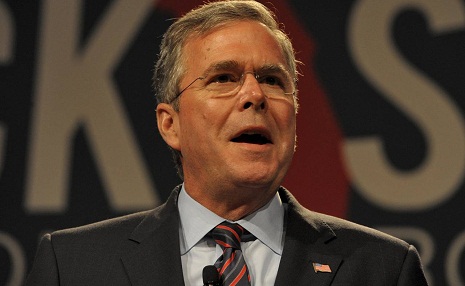While an aide said he would announce a decision that day on whether to run, Mr. Bush has in essence been campaigning for six months, and his presence in the race for the GOP nomination is all but certain.
“Gov. Bush is thankful for the support and encouragement he has received from so many Americans during the last several months and looks forward to announcing his decision,” said Kristy Campbell, a spokeswoman for Mr. Bush.
Mr. Bush has been under mounting pressure to make his campaign official, as critics charged he was delaying the presumed announcement to continue collecting unlimited donations for a super PAC he launched in January.
Once he is a formal candidate, Mr. Bush cannot solicit more than $5,000 a person for the super PAC or coordinate his activities with the PAC. Contributions to presidential campaigns are limited to $2,700 a person, forcing candidates to tap a wider network of supporters instead of relying on a smaller group of deep-pocketed donors.
Campaign-watchdog groups filed complaints with the Federal Election Commission in April and recently urged the Justice Department to investigate, arguing that Mr. Bush had been behaving as a candidate for months by raising money, traveling to early-nominating states and hiring political staff around the country. Mr. Bush insisted that he hadn’t made up his mind and that he was following the law.
“I hope I’m a candidate in the near future,” he said in an interview Sunday on CBS’ “Face the Nation.”
The super PAC is expected to report more than $100 million at the end of July, a stockpile that could help him outgun a crowded Republican field in a potentially protracted and costly primary battle.
The announcement will come immediately after Mr. Bush returns from Germany, Poland and Estonia in his first trip abroad as a presumptive candidate.
Fred Wertheimer, president of Democracy 21, said Thursday morning that he wouldn’t drop his complaint against Mr. Bush.
“Our Justice Department complaint is based on the fact he is already a candidate under federal law,” he said, “He has been a candidate for months.”
With former Secretary of State Hillary Clinton viewed as the likely Democratic nominee, Mr. Bush’s entry into the race will test voters’ appetite for candidates with familiar names and long experience in government over younger rivals. Mr. Bush’s welcoming views on immigration and support for the Common Core national education standards, both of which are out of step with the GOP base, will test his assertion that a successful candidate must be “willing to lose the primary to win the general [election] without violating your principles.”
In one of the first Republican primaries in decades without an heir apparent, Mr. Bush is a fragile front-runner. For months, he has hovered at or near the top of the national polls, the benchmark used to help determine eligibility in the initial televised GOP debates. But the surname of the 62-year-old Mr. Bush is a stumbling block for voters wary of political dynasties or who view Mr. Bush’s brother, former President George W. Bush, as making a flawed decision to lead the U.S. into war in Iraq. Rivals are pitching themselves as a younger, fresher generation of American leadership.
For his part, Mr. Bush frequently tells audiences he needs to “tell my own story,” yet he has hesitated to draw policy contrasts with his brother and father. He was roundly criticized--even by fellow Republicans--for spending days defending his brother’s management of the Iraq war before saying that he wouldn’t have initiated the military conflict if he knew there were no weapons of mass destruction.
Another challenge for Mr. Bush is his position on the wrong side of two of the top issues roiling the conservative grass roots: Common Core and immigration policy. Mr. Bush supports the national academic standards in English and math and says they will help raise student achievement, but some conservatives say they will lead to federal intrusion into local schools. Mr. Bush is also at odds with the conservative base of his party by backing legal status for undocumented workers.
But among the less ideologically driven political establishment, Mr. Bush is viewed as a top-tier contender. He hails from Florida, the nation’s largest swing state and one that is critical to the Republican nominee’s success. He is a former two-term governor of Florida, which may prove to be a strong credential among voters critical of President Barack Obama, a former one-term U.S. senator. After two elections in which the GOP nominee was rejected by an increasingly diverse electorate, Mr. Bush speaks fluent Spanish, is married to a Mexican-American and boasts strong ties with the fast-rising Hispanic community.
Miami-Dade College awards degrees to more Hispanics and African-Americans than any other institution in the U.S., providing a fitting backdrop for Mr. Bush’s message that anyone, regardless of their background, has the “right to rise.”
More about:
















































